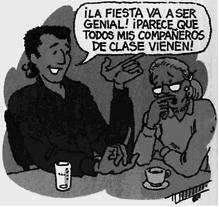Exhorted by their leader, some 900 members of the Reverend Jim Jones' People's Temple picked up paper cups and drank purple Kool-Aid laced with the deadly poison cyanide. Psychologically, the mass suicide at Jonestown in 1978 is not so incredible as it might seem. The inhabitants of Jonestown were isolated in the jungles of Guyana, intimidated by guards, and lulled with sedatives. They were also
cut off from friends and relatives and totally accustomed to obeying rigid rules of conduct, which primed them for Jones' final "loyalty test." Of greater psychological interest is the question of how people reach such a state of commitment and dependency. Why do people join groups such as the People's Temple? The People's Temple was a classic example of a cult. A cult is a group in which the leader's personality is more important than the beliefs she or he preaches. Cult members give their allegiances to this person, who is regarded as infallible, and they follow his or her dictates without question. Almost always, cult members are victimized by their leaders in some way or another. Psychologist Margaret Singer has studied and aided hundreds of former cult members. Her interviews reveal that in recruiting new members, cults use a powerful blend of guilt, manipulation, isolation, deception, fear, and escalating commitment. In this respect, cults employ high-pressure indoctrination techniques not unlike those used in brainwashing. In the United States alone, an estimated 2 to 5 million people have succumbed to the lure of cults. How are the techniques used by cults similar to those used in brainwashing?
a. Both use multiple leaders who rotate command. b. Members of the group are encouraged to be independent thinkers.
c. High-pressure indoctrination is used in both.
d. Victims are encouraged to socialize with others outside the group.
C
You might also like to view...
Complete the following paragraph, using the suggested words. There are two extra words in the list.
birra pizzeria divertente ieri scorso spiaggia vacanza buoni americana panini al prosciutto _______________ sera sono andata al cinema con i miei amici. Abbiamo visto un film italiano molto _______________. Dopo il cinema siamo andati a mangiare alla Cantina Romana e abbiamo ordinato quattro _________________. Abbiamo bevuto della buonissima _______________ tedesca e dopo siamo andati a casa mia per ascoltare un po' di musica _______________. Io sono fortunata (lucky) perché ho molti _______________ amici! Il mese ________________ siamo andati in _______________ insieme. Siamo andati in Calabria, vicino al mare. Abbiamo passato il tempo sulla _____________ a prendere il sole, o in ______________ a mangiare. Che bei ricordi!
¡Vaa ser genial! Ramón and doña Rosa, the owner of a home that houses university students, are talking. Ramón is very excited about the plans he is making for a party. Imagine the feelings of several people involved and the condition of doña Rosa's house. Complete each sentence in a logical manner with the correct form of estar and an appropriate adjective from the list. Use five different adjectives.

Rewrite the passive sentences
1. _____ The study session was led by Jennifer. 2. _____ Brett and Rocio are delivering meals to the rest home. 3. _____ My watch was borrowed by Oscar. 4. _____ The neighbor babysat the Johnsons’ dog. 5. _____ I wish I could go to your parents’ house with you. 6. _____ Heath was asked for his license by the sheriff. 7. _____ Many ideas were exchanged by members of the committee. 8. _____ Ted was accepted into the church by the deacon. 9. _____ I ran out of film during my vacation. 10. _____ Aaron’s proposal was accepted by the board.
Completa el párrafo con la forma apropiada del pretérito o del imperfecto de los verbos entre paréntesis.
Cuando _____________________1 (ser) pequeño, recuerdo que mis padres me _____________________2 (llevar) a la iglesia todos los domingos. En esa época, no _____________________3 (entender) mucho, pero _____________________4 (estar) fascinado con los rituales. Algunos años más tarde, _____________________5 (decidir) investigar más sobre la religión y cuestiones de la espiritualidad. Al principio eso me _____________________6 (causar) mucha confusión, pero luego me _____________________7 (ayudar) a entender qué era lo que realmente _____________________8 (creer) o no. Algunos amigos me _____________________9 (decir) que yo _____________________10 (estar) loco por preocuparme por esas cuestiones, pero ahora sé que mis creencias son mías y no simplemente las de mis padres.